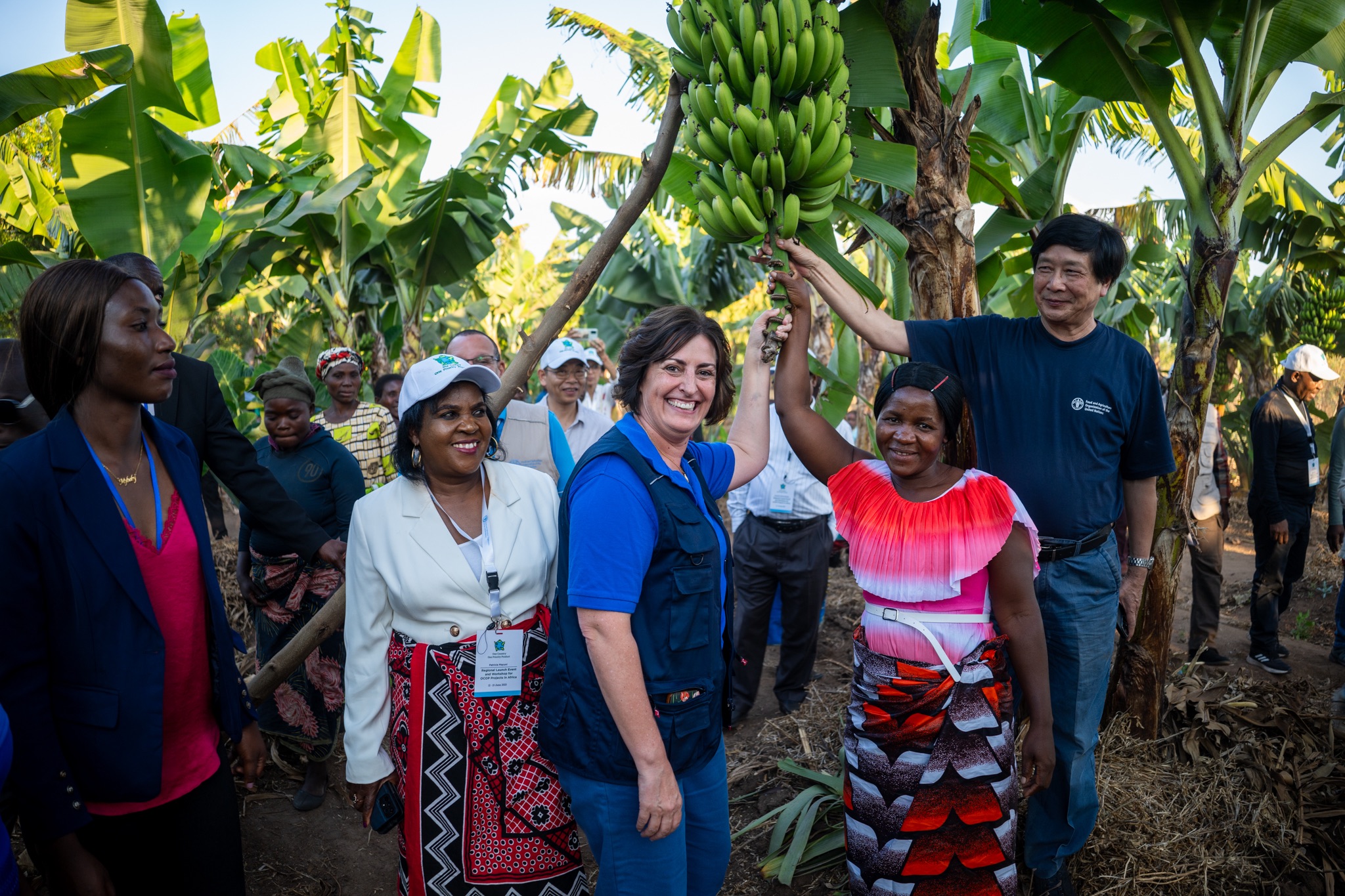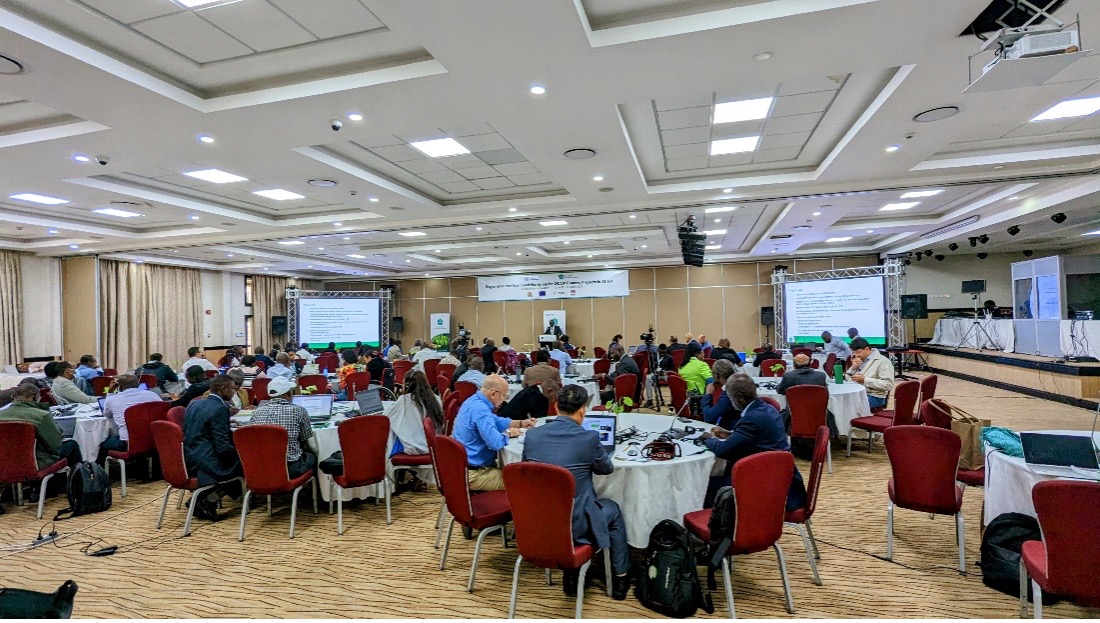News
FAO Regional Launch and Workshop on the Implementation of OCOP Country Projects in Africa

Group photo of all participants on day one of the regional launch and workshop on the implementation of OCOP Country Projects in Africa
©FAO
Blantyre, 12-13 June 2023 – Over 100 participants from all FAO Regions gathered in Blantyre, Malawi, for the FAO Regional Launch and Workshop on the Implementation of the Country Projects in Africa under the One Country One Priority Product initiative (OCOP). Malawi is hosting the event as one of five OCOP demonstration countries selected from over 80 countries that applied to be part of this initiative and at the forefront in the Africa Region. 35 countries were represented at the event, from all five FAO regions to learn from the example set by Malawi while also engaging with stakeholders to build on progress thus far and maximize the potential of the OCOP initiative.
Honourable Sam Dalitso Kawale, Minister for Agriculture of Malawi warmly welcomed the participants and conveyed the Government of Malawi’s happiness to have the country chosen as a demonstration, particularly given the need for value chain development after the recent impact of the banana bunchy top virus (BBTV) outbreak which devastated the crop in Malawi. Zhijun Chen, FAO Representative in Malawi, and Patrice Talla, FAO Sub-Regional Coordinator for Southern Africa, also welcomed the participants, underlining the importance of the OCOP and expressing their appreciation for selecting Malawi as the host country for the OCOP Regional Launch and Workshop.
The two-day event was officially opened by Beth Bechdol, FAO Deputy Director-General, who recalled the importance of the FAO OCOP initiative. She informed those gathered that over 10 million USD were already mobilized for the implementation of OCOP through FAO Regular, Technical Cooperation and Partnership Programmes. FAO-China South-South Cooperation alone provided 5 million USD, which is the largest single contribution. She highlighted that OCOP as a catalyst for transformation “focuses on diversification and on unlocking the untapped potential of agricultural products, and in identifying and addressing gaps in the value chain – from production to post-harvest, marketing and consumption.” Jingyuan Xia, Director of FAO Plant Production and Protection Division, mentioned that OCOP meets farmers’ demands; it is based on country ownership and has a multistakeholder model, all features on display with the Malawi example for sustainable development of the banana value chain.
 |
Mrs Makwewa gives a tour of her family's banana orchard, with Deputy Director-General Beth Bechdol, Jingyuan Xia, Director of the FAO Plant Production and Protection Division, and Patricia Mayuni, Programme Manager at the Blantyre Agriculture Development Division |
The first day continued with keynote presentations on the OCOP implementation. The progress at the global level was presented by Hafiz Muminjanov, OCOP Global Coordinator; at the regional – by Edward Kilawe, OCOP Alternate Regional Focal Point in Africa and at the national level – by Elida Kazira, Director of Crop Development, Ministry of Agriculture, the Government of Malawi. The specific knowledge-sharing on the banana value chain development in Malawi was done by Prof. Emmanuel Kaunda, Vice Chancellor of Lilongwe University of Agriculture and Natural Resources, and by Prof. Jingyang Li, a Banana Expert from the Chinese Academy of Tropical Agricultural Sciences.
In the afternoon, the participants visited the Thuchira Residential Training Centre, where the extension specialists are trained to facilitate the development of the banana sector in Malawi through capacity-developing, innovation and experimentation with local and introduced banana varieties. The field visits continued at several small-scale farmers’ banana orchards by the groups of participants. Deputy Director-General Bechdol and Director Xia were invited to Mr and Mrs Makweya’s three-hectare banana orchard. This banana-growing farm has expanded production and hired workers from the local community while using sustainable agricultural practices. They are excited that OCOP provides more opportunities to improve the banana value chain further.
On the second day of the workshop, the morning discussions focused on the implementation of the OCOP country projects in Africa. Selected OCOP potential project countries presented the Concept Notes on the sustainable development of the value chains of the Special Agricultural Products, developing the workplans and establishing the National OCOP task Forces as the strong coordination mechanisms at the national level. Furthermore, the participants were divided into three groups and held parallel discussions on coordination and synergies, technical support and capacity development, multistakeholder engagement and resource mobilization for the successful implementation of the OCOP. The outputs of each parallel discussion were reported to the participants at the plenary session.
 |
Participants at the FAO Regional Launch and Workshop on the Implementation of the OCOP Country Projects in Africa |
In all sessions, the active engagement of all participants was observed. They were keen to learn more and compare strategies in different countries, with the purpose of finalizing the project proposals. The closing session, moderated by Director Xia, underlined the positive feedback and feeling of two intense days of productive discussions. Honourable Sam Dalitso Kawale, Minister for Agriculture of Malawi once again appreciated FAO and reassured the Government of Malawi's commitment to the sustainable development of banana value chains. To close this important regional event, FAO Deputy Director-General Bechdol reassured that FAO remains committed to supporting OCOP implementation, paired with the enthusiasms of many countries, demonstrating that smallholder farmers will be enabled to grow while building a more sustainable, more inclusive and more efficient agrifood system.

